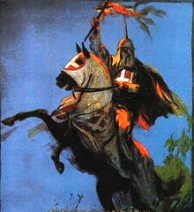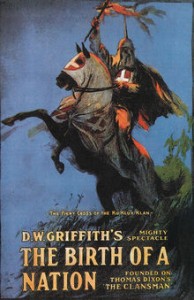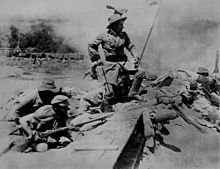The Birth of a Nation


 Also known as “The Birth of a Nation” or the Clansman.” Controversially racist D.W. Griffith film depicting the lives of two families, one Northern and one Southern, from before the Civil War and into Reconstruction. The families’ servants epitomize the worst racial stereotypes and as the nation is ravaged by war, the slaves and abolitionists are blamed for it, while the formation of the Ku Klux Klan is cast as the film’s would-be heroes! The film also includes a seemingly misplaced love story.
Also known as “The Birth of a Nation” or the Clansman.” Controversially racist D.W. Griffith film depicting the lives of two families, one Northern and one Southern, from before the Civil War and into Reconstruction. The families’ servants epitomize the worst racial stereotypes and as the nation is ravaged by war, the slaves and abolitionists are blamed for it, while the formation of the Ku Klux Klan is cast as the film’s would-be heroes! The film also includes a seemingly misplaced love story.
The Birth of a Nation (originally called The Clansman) is a 1915 silent drama film directed by D. W. Griffith and based on the novel and play The Clansman, both by Thomas Dixon, Jr.Griffith co-wrote the screenplay (with Frank E. Woods), and co-produced the film (with Harry Aitken). It was released on February 8, 1915. The film was originally presented in two parts, separated by an intermission.
The film chronicles the relationship of two families in Civil War and Reconstruction-era America: the pro-Union Northern Stonemans and the pro-Confederacy Southern Camerons over the course of several years. The assassination of President Abraham Lincoln by John Wilkes Booth is dramatized.
The film was a commercial success, but was highly controversial owing to its portrayal of African American men (played by white actors in blackface) as unintelligent and sexually aggressive towards white women, and the portrayal of the Ku Klux Klan (whose original founding is dramatized) as a heroic force. There were widespread protests against The Birth of a Nation, and it was banned in several cities. The outcry of racism was so great that Griffith was inspired to produce Intolerance the following year.
The movie is also credited as one of the events that inspired the formation of the “second era” Ku Klux Klan at Stone Mountain, Georgia in the same year. The Birth of a Nation was used as a recruiting tool for the KKK. It was the first motion picture to be shown at the White House. President Woodrow Wilson supposedly said the film was “like writing history with lightning. And my only regret is that it is all so terribly true.” The attribution is disputed.
Plot
Part 1: Pre-Civil War America
The film follows two juxtaposed families: the Northern Stonemans, consisting of the abolitionist Congressman Austin Stoneman (based on the Reconstruction-era Congressman Thaddeus Stevens), his two sons, and his daughter Elsie; and the Southern Camerons, a family including two daughters, Margaret and Flora, and three sons, most notably Ben.
The Stoneman brothers visit the Camerons at their South Carolina estate, representing the Old South. The elder of the two Stoneman sons falls in love with Margaret Cameron, while Ben Cameron idolizes a picture of Elsie Stoneman. When the Civil War begins, all the young men join their respective armies.
A black militia (with a white leader) ransacks the Cameron house. The Cameron women are rescued when Confederate soldiers rout the militia. Meanwhile, the younger Stoneman and two of the Cameron brothers are killed in the war. Ben Cameron is wounded after a heroic charge at the Siege of Petersburg, in which he gains the nickname “the Little Colonel”. He is taken to a Northern hospital where he meets Elsie Stoneman, who is working there as a nurse. While recovering, Cameron is told that he will be hanged for being a guerrilla. Elsie takes Cameron’s mother, who has traveled to Washington to tend her son, to see Abraham Lincoln. Mrs. Cameron persuades Lincoln to issue a pardon.
When Lincoln is assassinated at Ford’s Theater, his conciliatory postwar policy expires with him. Austin Stoneman and other radical congressmen are determined to punish the South, using harsh measures that Griffith depicts as typical of the Reconstruction era.
Part 2: Reconstruction
 Battle scene from The Birth of a Nation
Battle scene from The Birth of a Nation
Stoneman and his mulatto protégé, Silas Lynch, go to South Carolina in 1871 to observe the situation first hand. Black soldiers parade through the streets. During the election, whites are turned away while blacks stuff the ballot boxes. Lynch is elected Lieutenant Governor. The newly-elected mostly-black legislature is shown at their desks, with one member taking off his shoe and putting his feet up, and others drinking liquor and feasting. They pass laws requiring white civilians to salute black officers and allowing mixed-race marriages.
Meanwhile, inspired by observing white children pretending to be ghosts to scare off black children, Ben fights back by forming the Ku Klux Klan. As a result, Elsie breaks off their relationship out of loyalty to her father. Gus, a freedman and soldier who is now a Captain, follows Flora Cameron as she goes alone to fetch water. He tells her he is looking to get married. Frightened, she flees into the forest, pursued by Gus. Trapped on a precipice, Flora warns Gus she will jump if he comes any closer. When he does, she leaps to her death. Ben finds his sister, having run through the Forest looking for her and seen her jump, and holds her as she lies dying. The Klan hunts Gus down, tries him, and finds him guilty. The clansmen leave his corpse on Lynch’s doorstep.
Lynch orders a crackdown on the Klan. Dr. Cameron, Ben’s father, is arrested for having Ben’s Klan costume, a crime punishable by death. Ben and their faithful servants rescue him, and the Camerons flee. When their wagon breaks down, they make their way to a small hut, home to two former Union soldiers, who agree to hide them. As an intertitle states, “The former enemies of North and South are united again in defense of their Aryan birthright.”
Austin Stoneman leaves to avoid being connected with Lynch’s crackdown. Elsie, learning of Dr. Cameron’s arrest, goes to Lynch to plead for his release. Lynch tries to force Elsie to marry him and she finally faints. Stoneman returns, causing Elsie to be placed in another room, and is happy at first when Lynch tells him he wants to marry a white woman, but is angered when Lynch tells him which one. Disguised Klansmen spies discover Elsie’s plight when she breaks a window and cries for help and leave to get help. She falls unconscious again, and revives gagged and being bound. The Klan, gathered together at full strength and with Ben leading them, rides in to regain control of the town. When news reaches Ben about Elsie, he and others go to her rescue. Elsie frees her mouth and screams for help. Lynch is captured. Victorious, the clansmen celebrate in the streets. Meanwhile, Lynch’s militia surrounds and attacks the hut where the Camerons are hiding. The clansmen, with Ben at their head, race to save them just in time.
The next election day, blacks find a line of mounted and armed Klansmen just outside their homes, and are intimidated into not voting. The film concludes with a double honeymoon of Phil Stoneman with Margaret Cameron and Ben Cameron with Elsie Stoneman. The masses are shown oppressed by a giant warlike figure who gradually fades away. The scene shifts to another group finding peace under the image of Christ. The penultimate title rhetorically asks: “Dare we dream of a golden day when the bestial War shall rule no more? But instead-the gentle Prince in the Hall of Brotherly Love in the City of Peace.”
Cast
|
Uncredited:
|

